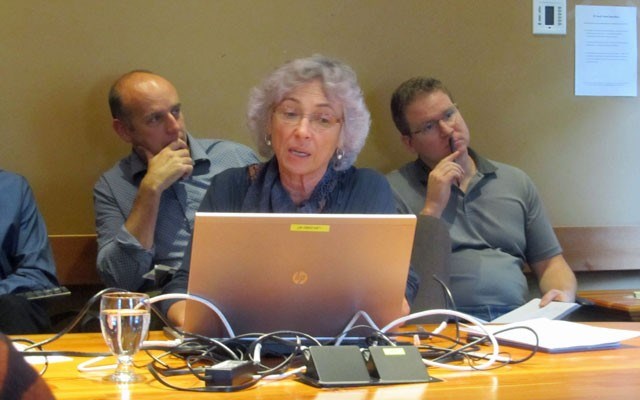The first thing Anne Popma did when she took on the newly created role of community cultural officer for Whistler in June was to crunch numbers. Crunch numbers and collate studies.
She wanted to take the many ideas floating around about arts and culture at the resort and create a practical list of options for all arts stakeholders and decision makers.
The aim, she told Whistler council at the Committee of the Whole (COW) meeting on Tuesday, Oct. 7, was to build "an integrated quote to cultural planning."
Popma looked at seven studies and work plans created in recent years, including the education taskforce, the recreation and leisure plan, the corporate plan, the EPI report and, of course, the community cultural plan and the cultural tourism development strategy — and found they generated 106 recommendations that overlapped the cultural tourism scene.
"So I wondered how we could take those recommendations and pull them together into a cultural plan," she said.
The 106 were prioritized down to 31, with two, the regeneration of the Rainbow Theatre and the hiring of a community cultural officer, already accomplished.
As well, 150 different cultural experiences such as culinary, festivals and arts were found to be at play — and hundreds of Whistler artists and creators themselves would be at the heart of taking it forward.
She also informally identified 50 different cultural occupations involving over 800 people in the resort.
"I'm trying to demonstrate that there are a large number of voices who are committed to the creative economy. This does not include the hundreds of people outside the circle, who work as volunteers or make financial contributions," she said.
Of those 800 people, 19 per cent worked directly in fine arts, 13 per cent as architects and designers, 13 per cent in administration, 11 per cent in commercial retail, 10 per cent each in photography-film, artisans and the performing arts, six per cent in publishing and broadcasting, four per cent in the literary arts and two per cent in event programming.
After building this picture of arts and culture in Whistler, Popma began to condense to its essence.
"I realized we needed to create an integrated approach to cultural planning. It's not just approving some money to give to another organization to go and manage a street entertainment project," she said.
"My office is meant to facilitate, coordinate and advance recommendations."
Popma said she found that there were two basic assumptions when it came to cultural planning. The first, that there needed to be a vibrant local culture for the success of cultural tourism, and the second, that "cultural planning requires integration across the wide range of municipal planning processes."
She took these concepts and related them to municipal priorities for policies, and set four principles for priorities that she hopes to take forward in the future: Integration, economic impact, growing the cultural landscape and community enrichment through the arts.
Popma found three overarching goals that she wanted to achieve in the short term: enhancing cultural vitality to allow artists to prosper, expanding cultural capacity to maximize facilities already in place and enhancing awareness and participation by improving communication.
After Popma's presentation, Whistler Mayor Nancy Wilhelm-Morden called it "remarkable."
"It's fabulous work and everyone in this room should be very proud of what we've accomplished so far. We have a very exciting future," Wilhelm-Morden told Popma.
Popma called her role "another leg" of the cultural journey for Whistler in an interview after the COW was over.
"This is incrementally enhancing what we already have," she said.
"I learned the importance of working as a team, collaborating and influencing. That is what the job is all about. It's not about creating another organization. I learned the importance of breaking down silos and looking at our culture in a very broad perspective.
"It's not just something that the arts council does, or the film festival does. Our culture is the backbone of who we are as a community. Getting people to understand that was a big learning curve for me."




